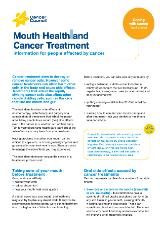Mouth sores
Some chemotherapy drugs can damage healthy cells in the mouth and cause mouth sores, ulcers (oral mucositis) or infections.
Chemotherapy treatment may also reduce the amount of saliva (spit) in your mouth, make your saliva thick or sticky, or make your mouth dry. This is called xerostomia or dry mouth. If you notice any sores, ulcers or thickened saliva, or if you find it difficult to swallow, tell your doctor.
For more on this, see Mouth health and cancer treatment and Taste and smell changes.
How to look after your mouth
- Discuss any dental issues with your oncologist or haematologist before seeing the dentist. If you need to have any dental work, tell your dentist you’re having chemotherapy.
- Use a soft toothbrush to clean your teeth twice a day.
- Rinse your mouth often – when you wake up, after you eat or drink, and at bedtime. Ask your doctor, nurse or pharmacist what type of alcohol-free mouthwash to use. They may give you a recipe for a homemade mouthwash. Talk to your doctor or nurse about medicines to relieve pain.
- Sip fluids, especially water, and eat moist foods such as casseroles or soups if you have a dry mouth.
- Soothe tender gums or mouth with plain yoghurt.
- Try sucking on ice during chemotherapy sessions. This may help to prevent mouth ulcers.
- Blend foods to make them easier to eat. Try smoothies made of fruit and yoghurt.
- Avoid smoking, vaping and alcoholic drinks, as well as very hot foods and spicy, acidic or coarse foods (e.g. nuts). These can all make mouth sores worse.
→ READ MORE: Skin and nail changes
Podcast: Coping with a Cancer Diagnosis
Listen to more of our podcast for people affected by cancer
A/Prof Kate Mahon, Director of Medical Oncology, Chris O’Brien Lifehouse, NSW; Katherine Bell, Dietetics Department, Liverpool Hospital, NSW; Brigitta Leben, Dietetics Department, Liverpool Hospital, NSW; Sophie Michele, 13 11 20 Consultant, Cancer Council SA; Dr Jess Smith, Medical Oncologist, Macquarie University Hospital, NSW; Karene Stewart, Consumer; Julie Teraci, Clinical Nurse Consultant, Skin Cancer and Melanoma, Cancer Network WA.
View the Cancer Council NSW editorial policy.
View all publications or call 13 11 20 for free printed copies.
